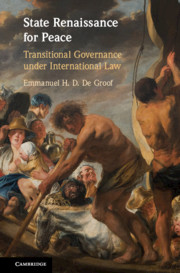'This is an important topic which has not received enough attention. The interim arrangements De Groof discusses are a key strategy for institutionalising transitions. De Groof’s work is an important contribution to mapping their core components through a detailed and broad comparative lens. The book deserves to be read by students, practitioners, and policy-makers, interested in transitions from conflict or social crisis. The repository of comparative material forms an important resource in itself.'
Christine Bell - Professor of Constitutional Law, The University of Edinburgh
'De Groof confronts transitional governance as a practice and field of research of its own, extracting and detaching it from traditional research embedding transitional governance in specific contexts and narratives. The book’s focus on international law as a tool for analysing transitional governance brings in an inspiring legal ‘formalism’ to the debate, with the necessary nuances and restraints. The book is without much doubt a welcome and thought-provoking contribution to literature on the topic. It is a must-read for international lawyers in the field.'
Eric De Brabandere - Professor of International Dispute Settlement and Director, Grotius Centre for International Legal Studies, Leiden University
'Traditionally institutional change within a State is seen as a matter for domestic constitutional law. De Groof’s groundbreaking study of recent practice, however, demonstrates that international law plays a role in regulating this process. Today international principles such as self-determination and non-intervention provide a normative framework for governance in the process of achieving a just peace.'
John Dugard - Emeritus Professor of Law, Universities of Leiden and the Witwatersrand
'In State Renaissance for Peace, Dr De Groof makes the useful argument that even if not directly governed by international law, situations of transitional governance within states are nonetheless embedded within international law, in particular via the principles of self-determination and non-intervention. Dr De Groof has written a timely and thought provoking study, illustrating that there is far more to international law than rules and compliance.'
Jan Klabbers - Professor of Law, University of Helsinki
'Transitional governance has played a crucial – if contested – role in societies grappling with a legacy of violent conflict and political instability, as well as other challenges. It poses difficult questions at the interface of international law, political ethics, and public policy. This fascinating volume provides a unique contribution – as perhaps the first in-depth analysis of transitional governance from an international law perspective and it is also meticulously researched and presented.'
Edward Newman - Professor of International Security, University of Leeds
'Emmanuel De Groof has undertaken a systematic and meticulous study of ius in interregno: the international law pertaining to an existing state’s transition from one political order to another. He elucidates the existing and emerging norms that bridle both transitional governing arrangements and external involvement in transition processes. A must-read for scholars concerned with the intersection of international and domestic legal authority.'
Brad R. Roth - Professor of Law, Wayne State University
'It appears at first that De Groof’s intrastate focus on transitional governance would be of comparative constitutional nature. But the author analytically, and very convincingly, leads his reader through the international legal framework of ius in interregno. The book is interdisciplinary, yet firmly grounded in public international law. A very valuable contribution to international law and related fields.'
Jure Vidmar - Professor of Public International Law, Maastricht University, The Netherlands



